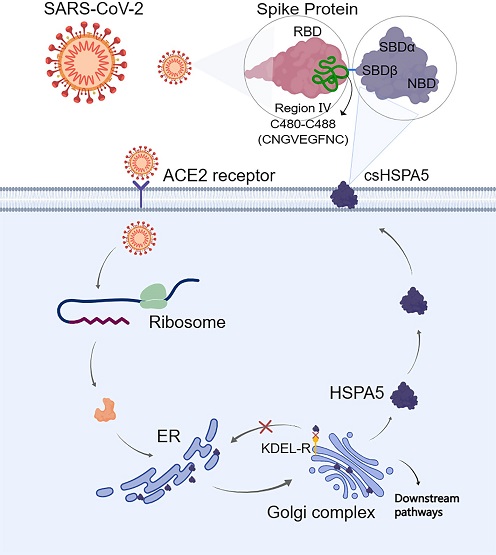BREAKING DISCOVERIES: Cell Surface Protein HSPA5/BiP/GRP78 Unveiled as Key Player in Cancers And Is Also A Receptor For SARS-CoV-2!
COVID-19 News - HSPA5-BiP-GRP78 - Receptors For SARS-CoV-2 Jun 01, 2023 1 year, 10 months, 2 weeks, 5 days, 11 hours, 50 minutes ago
COVID-19 News: In a groundbreaking study conducted by Southwest Medical University in Sichuan-China, and Cairo University in Egypt, scientists have revealed new and exciting insights into the cell surface protein known as HSPA5, also referred to as BiP or GRP78. This protein, encoded by the HSPA5 gene, has been found to have significant implications for both cancer and the ongoing battle against COVID-19.
 When the endoplasmic reticulum (ER) is stressed, heat shock protein A5 (HSPA5) is translocated
When the endoplasmic reticulum (ER) is stressed, heat shock protein A5 (HSPA5) is translocated
to the cell surface (csHSPA5) and subsequently bound to the region IV (C480-C488) through the
position of amino acids CNGVEGFNC in the spike protein (S-protein) of SARS-CoV-2, thus acted
as a receptor/entry protein for virus entry. For the cell surface protein HSPA5, its SBDβ domain
was predicted to bind to the spike protein. ER, the endoplasmic reticulum; KDEL-R, the
endoplasmic reticulum protein retention receptor; RBD, receptor binding domain; SBD,
substrate binding domain.
HSPA5 is a heat-shock-protein family A member 5, and it plays a crucial role in cellular processes. Traditionally, it was believed to reside in the endoplasmic reticulum (ER) within cells. However, this recent research has shown that when the ER is under stress, HSPA5 translocates to the cell surface, mitochondria, and nucleus, where it interacts with other proteins to carry out its diverse functions.
The study has uncovered the multifaceted roles of HSPA5/BiP/GRP78 on the cell surface, including its impact on cell viability, proliferation, apoptosis, attachments, and regulation of the immune system.
These study findings have important implications for various diseases, particularly cancer and COVID-19.
Cancer, one of the deadliest diseases worldwide, has been found to be closely linked to the expression of HSPA5. The study team discovered that HSPA5 is highly expressed in malignant tumors, making it a potential target for understanding the invasion and progression of cancer.
The expression of HSPA5 has been found to be significantly higher in most malignant cancers. Using comprehensive genomic analysis, the study team identified elevated HSPA5 mRNA expression in various cancer types, including thyroid carcinoma, brain lower-grade glioma, and prostate adenocarcinoma. This finding suggests that HSPA5 could serve as a valuable diagnostic and prognostic marker for cancer patients.
Furthermore, the researchers unraveled the functional role of HSPA5 in promoting cancer cell viability, proliferation, and migration through various molecular mechanisms and signaling pathways. For instance, HSPA5 was found to regulate the expression of oncogenic proteins and promote the degradation of migration-related proteins in different cancer types.
Furthermore, in the context of COVID-19, where individuals with cancer are particularly vulnerable, the role of HSPA5 becomes even more crucial.
It was found that HSPA5 could also function as receptors for the SARS-CoV-2 virus.
In the context of SARS-CoV-2 invasion, the study team are the first to explore the interaction between the virus and HSPA5. The spike protein on the surface of the virus pla
ys a crucial role in its entry into host cells, and HSPA5 has been identified as a key player in this process. The binding sites between the S-protein and HSPA5 have been elucidated, offering valuable information for the development of antiviral strategies.
The ongoing COVID-19 pandemic, caused by the severe acute respiratory syndrome coronavirus 2 (SARS-CoV-2), has taken the world by storm since its first outbreak in late 2019. The study team speculate that HSPA5 might play a critical role in the invasion and attack of SARS-CoV-2 in cancer patients through tumor tissues. Past studies and also
COVID-19 News reports have already shown that cancer patients tend to have more worse outcomes upon getting infected with the SARS-CoV-2 virus. This discovery reveals possible answers as to why and also opens up new possibilities for targeted therapies that could combat both COVID-19 and cancer simultaneously.
One promising avenue of exploration is the use of natural products to target HSPA5 expression. By leveraging the therapeutic potential of natural compounds, researchers hope to develop innovative treatments for COVID-19 and various types of cancer. This approach could revolutionize clinical practice and offer hope to millions of patients worldwide.
The study not only sheds light on the importance of HSPA5 in cancer and COVID-19 but also emphasizes its significance as a prognostic marker and a potential diagnostic tool. The study team has uncovered compelling evidence linking HSPA5 expression to patient outcomes, immune infiltration, and disease progression in different types of cancer. This breakthrough could pave the way for personalized treatment strategies and improved patient care.
Moreover, the study delves into the molecular mechanisms and signaling pathways through which HSPA5 influences cancer progression. These findings provide valuable insights into potential therapeutic targets for cancer treatment and offer a deeper understanding of the complex interplay between HSPA5 and other cellular components.
This groundbreaking research not only uncovers the multifunctional role of HSPA5 but also opens up a new frontier in the fight against cancer and COVID-19. The potential therapeutic significance and future prospects of targeting HSPA5 are vast.
The study findings were published in the peer reviewed journal: Frontiers in Immunology.
https://www.frontiersin.org/articles/10.3389/fimmu.2023.1166680/full
For the latest
COVID-19 News, keep on logging to Thailand Medical News.
